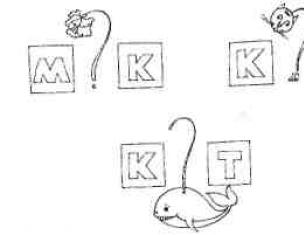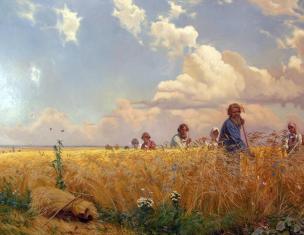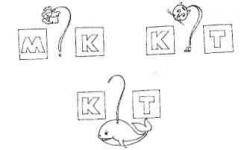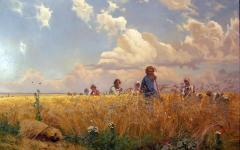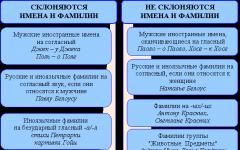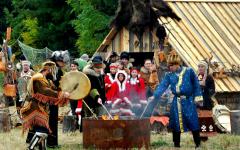A MONUMENT TO WHICH THE POPULAR TRAIL WILL NOT BE OVERGROWN. Many contemporaries of A. S. Pushkin, even during his lifetime, predicted a special place for him in Russian and world literature. The famous Russian critic V. G. Belinsky wrote about Pushkin: “The time will come when he will be a classical poet in Russia, based on whose works they will form and develop not only an aesthetic, but also a moral feeling.” And history has shown that he was absolutely right.
A.S. Pushkin left behind an invaluable legacy. The writer drew themes for his works from the depths of life. He subjected reality to bold criticism and at the same time found in it ideals that were close to the people. And from the heights of these ideals he assessed all events and phenomena of life. Pushkin became a truly people's poet, the soul of the people, their voice. In his work, he raised questions that worried both the poet’s contemporaries and subsequent generations.
Deeply, vividly and vividly expressing personal experiences in his poems, the poet is not limited to just a personal topic. His works constantly convey a genuine interest in other people, in the destinies of the people and the country. And this public topic worries the author as sincerely as a personal one. It is about this - about the meaning of life and the purpose of the poet - that he speaks in the poems “Poet”, “Prophet” and many others.
Bypassing seas and lands,
Burn the hearts of people with the verb.
This is how Pushkin understood his task and made high demands on himself. A poet can live a quiet life while his poetic spirit “tastes a cold sleep.” But there comes a moment when “the soul of the poet will perk up like an awakened eagle,” the “visionary eyes” will open and he will begin to see what is inaccessible to the gaze of an ordinary person, he will begin to hear “the shuddering of the sky,” “the underwater reptile of the sea and the vegetation of the valley vines.” . Creativity is a great work and feat, and the poet must be inspired by a big and important idea. Poetry, according to Pushkin’s firm conviction, must strictly follow the truth, devotedly serve freedom, beauty, goodness and justice. The most strict judge of his work is the poet himself:
...You yourself are your own highest court,
You know how to evaluate your work more strictly than anyone else.
Are you satisfied with it, discerning artist?
Satisfied? So let the crowd scold him...
The author calls on the poet not to pay attention to the opinion of the crowd, to be indifferent to blasphemy and praise. After all, praise, insult and slander are temporary. The only constant is devotion to your high ideals. And Alexander Sergeevich sought to follow these requirements and tasks throughout his life. He constantly lived the life of his country, its joys and sorrows, its successes and sufferings, its glory and pain.
Pushkin was a poet of freedom: his work calls for freedom - political and spiritual, freedom from slavery and prejudice. He dedicated it to serving people, fighting for happiness and justice. “The poet is the echo of the world,” wrote M. Gorky.
Pushkin was a poet for the elite, and at the same time, his works reflect characteristic, typical experiences and feelings that are understandable and close to most people. Thus, the poem “Village” and the ode “Liberty” reflected the thoughts and aspirations of progressively minded sections of society. And the poems “I loved you...” or “I remember a wonderful moment...” contain sincere tender feelings that excited and will always excite the hearts of all people, regardless of their views and political beliefs.
Pushkin was the “poet of reality”; all the diversity of life’s phenomena resonated in his work; the whole colorful living world excited the “tender mind” of the poet. And in this whole world, in every detail imperceptible at first glance, he knew how to find the beauty and harmony hidden in it. N.V. Gogol asked himself the question: “What was the subject of his poetry?” And the answer was obvious and amazing: “Everything has become its subject... Thought becomes numb before the countless number of its subjects.”
In his poem “I am a monument to myself...” the poet expresses the hope that future generations will understand and appreciate him, and love his poetry because it awakens the best feelings. With all his creativity, all his life, all his thoughts, aspirations and deeds, A.S. Pushkin erected for himself a “monument not made by hands”, to which the “folk path” has not been overgrown for many years and will probably never be overgrown.
A. Alexandru II
B. Kutuzov M.I.
V. Minin K. and Pozharsky D.I.
G. Pushkin A.S.
What name did Nicholas II's wife, née Princess Victoria Alice Elena Louise Beatrice of Hesse-Darmstadt, take when she joined Orthodoxy?
A. Alexandra Fedorovna
B. Ekaterina Alekseevna
V. Elizaveta Fedorovna
G. Maria Fedorovna
How many children were in the family of Nicholas II?
A. two girls and two boys
B. three girls and two boys
V. three girls and a boy
G. four girls and a boy
During which war did the crossing of the Danube, the siege of Plevna, the defense of Shipka, and the battle of Sheinovo take place?
A. Krymskoy
B. World War I
V. Russian-Turkish
G. Russian-Japanese
9. From the list provided, select a discovery that was made at the end of the 19th century:
A. Lobachevsky geometry
B. Discovery of Antarctica
B. Mendeleev’s periodic table of chemical elements
D. Smallpox vaccination
10. Select a list that lists works that appeared in the second half of the 19th century:
A. Comedy “Woe from Wit”, painting “Deuce Again”, monument to “Minin and Pozharsky” on Red Square
B. Novel in verse “Eugene Onegin”, painting “Morning in a Pine Forest”, monument “Bronze Horseman”
V. Roman “Crime and Punishment”, painting “Black Square”, monument “Alexander Column”
G. Epic novel “War and Peace”, painting “Bogatyrs”, monument “Millennium of Russia”
LOGICS
1. Six vowels and spaces were missing from the proverb, restore it:
Kng-klchkznn
_____________________________
How many quadrilaterals are there in the picture?
_________________________
What combination of letters is the following?
LIBRARY
IBBLIOTEAK
IBBLIOTAYEK
IBLBIOATEK
____________________________
Fill in the empty cells.
Define the word in brackets.
1 28 12 (BY L I N A) 9 14 0
18 11 0 (. . . . . .) 8 11 0
Arrange the letters in the boxes so that you get the name of the famous Russian fabulist and one of the heroines of his works.
A B B C L N O O R R R
8. Guess what word is hidden in the picture (isograph):

________________________
9. Having solved the rebus, write down the title of the work and indicate its author:

___________________________
10. Remembering literary terms, solve the metagram by writing both words that consist of 6 letters in your answer.
The first consists of combinations of the second
The first differs from the second by the penultimate letter
The first one has a note at the end
Reading the letters in them in order 5432, we will see in the first strengthening,
and in the second there is a sports ground .
READING
The reigns of Emperors Alexander II, Alexander III and Nicholas II are the “golden years” of charity and mercy. At this time, a whole system of guardianship begins to take shape. Among the representatives of the reigning House of Romanov there were real devotees of charity and mercy: Empresses Maria Alexandrovna, Alexandra Feodorovna, Maria Feodorovna (mother of Nicholas II), Grand Duchesses Elizaveta Feodorovna (now the holy martyr Elizabeth), Alexandra Petrovna (now the holy nun Anastasia of Kiev), a close relative of the imperial family, Prince Peter of Oldenburg - trustee of the Kiev Home for the Poor, patron of the Eye Hospital. Many members of the House of Romanov used their own funds to build charitable institutions, shelters and almshouses, and actively patronized charitable institutions.
The tradition of Russian charity was broken by the 1917 revolution. All funds of public and private charitable organizations were quickly nationalized, their property was transferred to the state, and the organizations themselves were abolished by special decrees.
The “Our Heritage” Olympics cooperates with the Orthodox aid service “Mercy”.
27 service projects are located in different parts of Moscow, and some programs extend throughout the country. The “Mercy” service is a single organism, a single service for helping the most disadvantaged: lonely old people, disabled people, pregnant women who find themselves without a roof over their heads, orphans, homeless people, HIV-infected people.
One of the key features of the “Mercy” service is the presence of its own infrastructure, thanks to which it provides comprehensive, professional and long-term assistance to permanent wards. St. Sophia Social Home, Rehabilitation Center for Children with Cerebral Palsy, Elisabeth Orphanage, St. Spyridoniev Almshouse, “House for Mom” and many other projects are non-governmental non-profit institutions that are part of the “Mercy” service.
80% of the “Mercy” service exists on donations, so the fate of everyone whom the service helps depends on how regularly funds are received from philanthropists. The "Mercy" service has about 400 permanent clients - those whom the "Mercy" employees take care of from year to year. These are orphans raised in orphanages and state boarding schools, lonely old people in an almshouse, disabled adults in a psychoneurological boarding school and others. In just one year, the Mercy service helps more than 20,000 people in need.
It would be great if at least once a year each participant in our Olympiad consciously refuses, for example, from buying ice cream and transfers these funds to support one of the Mercy services https://miloserdie.help/projects/.
Together we can do a lot of good.
I erected a monument to myself, not made by hands,
The people's path to him will not be overgrown,
He ascended higher with his rebellious head
Alexandrian Pillar.
No, all of me will not die - the soul is in the treasured lyre
My ashes will survive and decay will escape -
And I will be glorious as long as I am in the sublunary world
At least one piit will be alive.
Rumors about me will spread throughout Great Rus',
And every tongue that is in it will call me,
And the proud grandson of the Slavs, and the Finn, and now wild
Tungus, and friend of the steppes Kalmyk.
And for a long time I will be so kind to the people,
That I awakened good feelings with my lyre,
That in my cruel age I glorified Freedom
And he called for mercy for the fallen.
By the command of God, O muse, be obedient,
Without fear of insult, without demanding a crown,
Praise and slander were accepted indifferently
And don't argue with a fool.
Analysis of the poem “I erected a monument to myself not made by hands” by Pushkin
A draft of the poem was discovered after Pushkin's death. It dates from 1836. It was first published in the posthumous edition of the poet's works (1841).
The poem marked the beginning of a debate that continues to this day. The first question concerns the source that inspired Pushkin. Many considered the work to be a simple imitation of numerous odes by Russian poets on the theme of the monument. A more common version is that Pushkin took the main ideas from Horace’s ode, from which the epigraph to the poem was taken.
A more serious stumbling block was the meaning and significance of the work. The lifetime praise of his merits and the author’s conviction in his future glory caused criticism and bewilderment. In the eyes of contemporaries, this, at a minimum, seemed to be excessive conceit and insolence. Even those who recognized the poet’s enormous services to Russian literature could not tolerate such impudence.
Pushkin compares his fame to a “monument not made by hands”, which exceeds the “Alexandria Pillar” (monument to Alexander I). Moreover, the poet claims that his soul will exist forever, and his creativity will spread throughout multinational Russia. This will happen because throughout his life the author brought people ideas of goodness and justice. He always defended freedom and “called for mercy for the fallen” (probably for the Decembrists). After such statements, Pushkin also reproaches those who do not understand the value of his work (“don’t argue with a fool”).
Justifying the poet, some researchers stated that the verse is a subtle satire of the author on himself. His statements were considered a joke about his difficult position in high society.
Almost two centuries later, the work can be appreciated. The years have shown the poet's brilliant foresight of his future. Pushkin's poems are known all over the world and have been translated into most languages. The poet is considered the greatest classic of Russian literature, one of the founders of the modern Russian language. The saying “I will never die” was completely confirmed. The name of Pushkin lives not only in his works, but also in countless streets, squares, avenues and much more. The poet became one of the symbols of Russia. The poem “I erected a monument to myself not made by hands” is a well-deserved recognition of the poet, who did not expect this from his contemporaries.
Tsudakhar Secondary School
With. Tsudahar
![]()


Prepared by:
The purpose of the lesson:
Analysis of the poem “I erected a monument to myself not made by hands...”, through which students need to understand the poet’s main idea about the human creator.
Lesson objectives:
- systematize and generalize students’ knowledge acquired in previous literature lessons; continue to develop the ability to analyze a lyric poem and awaken students’ interest in personality and creativity; develop logical and analytical thinking through artistic imagination and oral drawing; to provide an opportunity to feel the power of words, images, ideas, to cultivate interest and respect for the work of A. Pushkin.
Lesson equipment:
Multimedia projector, multimedia presentation (application), musical arrangement, video, illustrations of monuments, text of Pushkin’s poem “Monument”, interactive board
During the classes:
You, like my first love,
The heart will not forget Russia.
Waltz music sounds quietly, and against its background the student reads an excerpt from Natalya Sazhenkova’s poem “The Great Poet”:
There are many famous people in the world,
Whose glory has passed through the years to us,
But all children read Pushkin’s fairy tales,
We can’t help but remember him now.
The great poet left us a legacy,
Winged thoughts, truthful language.
And Pushkin’s word moves our hearts,
And everyone here is accustomed to Pushkin’s thought.
“About the prophetic Oleg” we learn from the song,
And we will read “Winter Morning” by heart.
“About Nanny” will be interesting for us to read,
And my heart will be filled with anxiety and sadness.
Streets in villages are named after Pushkin,
In big cities and regions of the country.
Museums, theaters, and schools are open,
We study it in more detail.
Teacher: - Pushkin’s poetry... This is the lofty truth about man, about life, about the soul. This is a spiritual heritage, pride and love of all humanity. Today in the lesson we will systematize and summarize the knowledge gained in previous literature lessons on the poet’s work and analyze his poem “I erected a monument to myself not made by hands...”.
After the introductory speech, the teacher projects statements about (slide 2) on the interactive board.
(the poet’s brother): “... he was ugly in appearance, but his face was expressive and animated, he was small in stature, but built unusually strong and proportionate.”
: “A man of small stature, but rather broad-shouldered and strong, with a quick and observant gaze, unusually lively...”
: “... without any pretensions, with lively, quick eyes, with a quiet, pleasant voice.”
After reading the statements, students in pairs prepare an answer to the question:
- “Pushkin... What is he like? "(Each pair is given blank sheets of paper; students give their own description of the poet’s personality and appearance).
Define the word “monument” using a dictionary. Having completed this work, they proceed to the next activity: the 1st group selects synonyms for the word “monument”, and the 2nd group gives a translation of this word and its synonyms into the Dargin language.
The teacher draws the students' attention to the illustrated material representing the monuments. Students also get acquainted with other monuments to the great poet located in different cities (slide 3,4,5).
Watch a video about how Pushkin’s birthday was celebrated in (video 1).
Teacher: Think about the question: “Did Pushkin have a presentiment that after his death they would remember him?”
After reading, vocabulary work is done. An explanation of the following words is written on the board (slide 7):
Piit is a poet.
The Alexandria Pillar is a 27-meter-high column erected in honor of Alexander I on Palace Square in St. Petersburg (an illustration of Palace Square in St. Petersburg is shown).
The treasured lyre is the art of the poet.
Erected - set, built.
A monument not made by hands - one that cannot be made by hand, cannot be created from stone, .
Accept - accept
Mercy is kindness.
Having read the explanation of some of the words given in the poem, students resume work in groups, formulating answers to the following questions (slide 8):
Why does Pushkin call his monument “not made by hands” and contrast it with the Pillar of Alexandria? Why is the poet sure that “the people’s path to him will not be overgrown”? In what lines does the poet talk about the immortality of his work?
Analysis of the poem: students need to repeat some information from the theory of literature, so they turn to the dictionary of literary terms, restoring in their memory the definition of such concepts as: theme, idea, composition, epithet, personification, metaphor.
Poem analysis scheme:
Year the poem was written; theme of the poem; the idea as it unfolds; composition; artistic means (epithets, comparisons, personifications, metaphors) What did the poet want to convey to the reader with this poem?
In their answers, students emphasize that, according to Pushkin, a real poet is independent of serving the secular crowd, he must serve freedom, beauty, truth, and goodness.
listen – hear
look - see
Do these words have the same meaning?
No, you can watch, but not delve into it
listen but not hear,
I ask you to hear and see,
Let's break into three groups and choose a topic for ourselves.
Lyrics of friendship.
While we are burning with freedom,
While hearts are alive for honor,
My friend, dedicated to the fatherland
Beautiful impulses from the soul!
Each student from the group reads the quatrain and analyzes it.
Why was this topic interesting to you?
Why did I choose this poem?
What lines stuck in your soul?
Can friendship influence a person's destiny?
Lyrics of love.
Keep me, my talisman,
Keep me in the days of persecution,
In days of repentance and excitement:
You were given to me on the day of sorrow.
When the ocean rises
The waves are roaring around me,
When the clouds burst into thunder,
Keep me safe, my talisman.
In the solitude of foreign countries,
In the bosom of boring peace,
In the anxiety of a fiery battle
Keep me safe, my talisman.
Holy sweet deception
A magical luminary of the soul...
It hid itself, changed...
Keep me safe, my talisman.
Let it be in the age of heart wounds
It won't spoil the memory.
Farewell hope; sleep, desire;
Keep me safe, my talisman.
How did you see Pushkin in love?
What is love?
What does love mean to you?
Pushkin about the poet.
And for a long time I will be so kind to the people,
That I awakened good feelings with my lyre,
That in my cruel age I glorified freedom
And he called for mercy for the fallen.
What does Pushkin see as the purpose of the poet and his poetry?
What is the feat and tragedy of Pushkin?
So, we enriched each other with our searches.
The music of G. Sviridov "Romance" is playing.
What was the melody?
What do you hear?
What musical instruments helped you hear it?
What feelings awakened in you?
What poem would you like to read?
Read it.
Creative work.
Let's light the candles, feel the warmth, take our hands and try to turn into young poets. It is necessary to choose a rhyme for the word ending the line.
The music "Seasons" is playing.
1 quatrain
On days of joy and desires
I was crazy about balls:
Or rather, there is no room for confessions
And for delivering a letter.
2 quatrains
It’s not the wind that bends the branch,
It’s not the oak tree that makes noise -
Then my heart groans
Like an autumn leaf trembling.
S. Stromilov
3 quatrains
The blue dove is moaning,
He moans both day and night
His dear little friend
Flew away for a long time.
Teacher: Pushkin continued to live an energetic creative life until his very last days. The poet died, as Herzen said, “in the prime of his life, without finishing his songs, without finishing what he could have said.” The last hours of life... (Sviridov's waltz sounds quietly). Listen to what they were like for the poet.
Student 1: (slide 9) The news of the duel quickly spread throughout St. Petersburg. Hundreds of people were rushing to the house on the Moika. There were only no court nobility. Zhukovsky, in a letter to Pushkin’s father, reported on the last hours of the poet’s life: “Having sent Dahl to encourage his wife with hope, Pushkin himself had none. One day he asked, “What time is it?” And in response to Dalya’s answer, he continued in an intermittent voice: “How long... should I... suffer like this? Please hurry!” Pushkin’s last words: “Life is over...”
Student 2: the poet died. In the “St. Petersburg” of 1837, a message was made: “Yesterday, January 29, at 3 o’clock in the afternoon, Alexander Sergeevich Pushkin died.” The poet's grave is located in the Svyatogorsk Monastery, not far from Mikhailovsky. In honor of the great poet, twice a year - on the day of his birth and his death - the bells of the Svyatogorsk Church ring (slide 10).
Be proud, centuries-old Russia,
You gave Pushkin to the world.
Grieve and cry, suffering,
Why didn't you save it...
Teacher: Years and centuries have passed since the birth and death of Pushkin, but Pushkin still teaches us to believe in people, to seize the beautiful moments of life, to end all disputes and to see the beauty in life, he unites us, people of different nationalities.
D\Z: Write an essay “My Pushkin”
I erected a monument to myself, not made by hands,
The people's path to him will not be overgrown,
He ascended higher with his rebellious head
Alexandrian Pillar.
No, all of me will not die - the soul is in the treasured lyre
My ashes will survive and decay will escape -
And I will be glorious as long as I am in the sublunary world
At least one piit will be alive.
Rumors about me will spread throughout Great Rus',
And every tongue that is in it will call me,
And the proud grandson of the Slavs, and the Finn, and now wild
Tungus, and friend of the steppes Kalmyk.
And for a long time I will be so kind to the people,
That I awakened good feelings with my lyre,
That in my cruel age I glorified Freedom
And he called for mercy for the fallen.
By the command of God, O muse, be obedient,
Without fear of insult, without demanding a crown;
Praise and slander were accepted indifferently
And don't argue with a fool.
Updated: 2011-05-09
LookAttention!
Thank you for your attention. Historical and biographical material History of creation and date of writing of the poem The poem was written a few months before the poet's death in 1836. It was read by Pushkin at the New Year's ball. The place of the poem in the poet’s work The poet sums up his work, trying to look into the future. The main theme of the poem The poem “Monument” is dedicated to reflections on the purpose of the poet and poetry on earth. It seems to me that this poem expresses the poet’s strong, already established views. According to Pushkin, the poet is God's messenger who brings the righteous word to the people. The author is confident that his work will not fade over the years, and people will always be interested in his creations. Theme of creativity, poet and poetry. Lyrical plot The plot of the poem is an understanding of the poet’s fate on a historical scale. The problem of the poem The problem of consolidating one's fame as a poet over time. Poem composition Pushkin believes that his soul, contained in poetry, is immortal: Soul in the treasured lyre My ashes will survive and decay will escape. In the last stanza, the poet calls on the muse to be supportive, that is, he asks that inspiration not leave him. He also asks you to “accept praise and slander indifferently,” because the crowd is fickle: today it praises, and tomorrow it shames and hates your poems. Of course, this will confuse or confuse anyone. The last line exhorts the muse to “not challenge a fool.” If a person does not understand everything that the poet wanted to convey in poetry, then there is no need to prove to him the importance of the poet and poetry on our land.
If you notice an error or typo, highlight the text and click Ctrl+Enter.
By doing so, you will provide invaluable benefit to the project and other readers.
In the first four stanzas, the lyrical hero reflects on his poetic heritage, the last stanza is an appeal to the muse.
Lyrical hero
Prevailing mood and its changes
The mood is solemn and sublime throughout the poem.
By its sublimity, the work can be defined as an ode. It glorifies the poet and his merits.
Five stanzas, quatrains.
Basic images
The image of the miraculous monument is created in comparison with a real granite column installed in 1834 on Palace Square in St. Petersburg in honor of the winner Napoleon, one of the organizers of the Holy Alliance of Emperor Alexander I.
The image of the muse is pure, untainted by pride. She does not accept flattery and does not condemn critics.
Vocabulary of the poem
Vocabulary of high style, which is typical for this genre: “erected”, “head”, “command”.
Poetic syntax
The poem uses many vivid means of linguistic expressiveness. For example, an allegory (the word “monument” means something that the poet created during his life), epithets (a monument not made by hands, with an unruly head, in the treasured lyre, the sublunary world, according to Great Rus', a living language, a friend of the steppes Kalmyk, wild Tungus), personifications (the soul will survive the dust and flee corruption; muse, be obedient, accept praise and slander indifferently, do not challenge a fool), antitheses (miraculous and rebellious, good feelings and cruel ages, praise and slander), archaic words that give the poem solemnity ( drink, until, in the treasured lyre, throughout Great Rus', he erected the miraculous, accepted, existing, do not dispute).
Complex sentences, inversion used.
Visual means of allegory
epithets: “monument not made by hands”, “rebellious head”, “treasured lyre”.
Sound recording
The dynamics of the development of the lyrical plot are conveyed by phonic means. The repetition that prevails in the first stanza emphasizes the key idea (sound associations):
I remember Nick erected for himself Not man-made ny,
TO Not mu Not will be overgrown on genus Naya trail,
WHO Not sit higher He head Not submissive Noah
Alex en Dry pillar.
No, all of me Not I'll die...
In the next three stanza-quatrains, such a phonic system as onomatopoeia comes to the fore. Thanks to the repetition of “d” with vowels, the echo of a bell can be heard. The impression is created not only solemn, but also alarming, since the assonant sound “u” is activated. In the last stanza he prevails, emphasizing tragic notes in the psychological state of the lyrical hero.
Iambic hexameter, two-syllable foot with stress on the 2nd syllable.
Rhythm and rhyme. Methods of rhyming
The rhyme is cross.
Emotions evoked while reading
In my opinion, the poem “Monument” is one of the most striking and beautiful poems by A.S. Pushkin, which occupies a significant place in his work.


